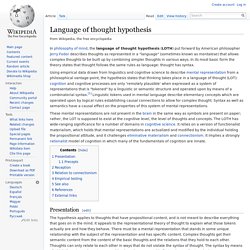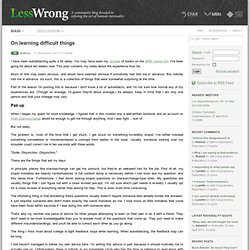

Language of thought hypothesis. In philosophy of mind, the language of thought hypothesis (LOTH) put forward by American philosopher Jerry Fodor describes thoughts as represented in a "language" (sometimes known as mentalese) that allows complex thoughts to be built up by combining simpler thoughts in various ways.

In its most basic form the theory states that thought follows the same rules as language: thought has syntax. These mental representations are not present in the brain in the same way as symbols are present on paper; rather, the LOT is supposed to exist at the cognitive level, the level of thoughts and concepts. The LOTH has wide-ranging significance for a number of domains in cognitive science. It relies on a version of functionalist materialism, which holds that mental representations are actualized and modified by the individual holding the propositional attitude, and it challenges eliminative materialism and connectionism. Presentation[edit] Precepts[edit] 1. 2. Reception[edit] Empirical testing[edit] How to work. Kostas Kiriakakis.
An Essay by Einstein. "How strange is the lot of us mortals!

Each of us is here for a brief sojourn; for what purpose he knows not, though he sometimes thinks he senses it. But without deeper reflection one knows from daily life that one exists for other people -- first of all for those upon whose smiles and well-being our own happiness is wholly dependent, and then for the many, unknown to us, to whose destinies we are bound by the ties of sympathy. A hundred times every day I remind myself that my inner and outer life are based on the labors of other men, living and dead, and that I must exert myself in order to give in the same measure as I have received and am still receiving...
"I have never looked upon ease and happiness as ends in themselves -- this critical basis I call the ideal of a pigsty. The ideals that have lighted my way, and time after time have given me new courage to face life cheerfully, have been Kindness, Beauty, and Truth. "My political ideal is democracy. 50 Questions That Will Free Your Mind. Welcome to Less Wrong. On learning difficult things. I have been autodidacting quite a bit lately.

You may have seen my reviews of books on the MIRI course list. I've been going for about ten weeks now. This post contains my notes about the experience thus far. Much of this may seem obvious, and would have seemed obvious if somebody had told me in advance. But nobody told me in advance. Part of the reason I'm posting this is because I don't know a lot of autodidacts, and I'm not sure how normal any of my experiences are. Pair up When I began my quest for more knowledge, I figured that in this modern era, a well-written textbook and an account on math.stackexchange would be enough to get me through anything.
But not really. The problem is, most of the time that I get stuck, I get stuck on something incredibly stupid. "Dude. These are the things that eat my days. In principle, places like stackexchange can get me unstuck, but they're an awkward tool for the job. The thing I miss most about college is tight feedback loops while learning. Art versus science at Westminster Abbey. I am sat at a pew in Westminster Abbey, filled with a sense of awe and reverence.

Unlike the elderly lady to my right, her hands clasped in silent petition, I am not here for prayer. I am, however, here on a pilgrimage of sorts in an attempt to understand the power and limits of science. Five steps to my left and I will be stood over what remains of Charles Darwin. Four steps forward and I will come face to face with the death mask of Issac Newton. But it will take a keener eye to spot the object of my pilgrimage. Kings, Queens and statesmen have relied on the skill of artists to convey, perhaps fabricate, a sense of their importance and success in life. I have with me, to aid my pilgrimage, a copy of Dirac’s Lectures on Quantum Mechanics in which he lays out in just 87 pages the mathematical ideas that lead to his equation. He was just as inexpressive in his personal life, speaking only when necessary and answering with one word sentences. Can science be rescued?